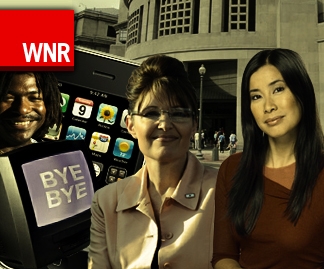It may be the most hateful four-letter word in the English language: “them.”
As in, “Them Jews ain’t going to let him talk to me,” which was Jeremiah Wright’s response, recently, to a reporter’s question about whether he had spoken with President Obama since the inauguration.
A day later, following an unsurprising scorching by FOX news, and having been named Keith Olbermann’s “Worst Person in the World,” Dr. Wright sought to clarify his comments: “I misspoke,” he told an interviewer, before launching into a critique of Israeli policy and influence in Washington. “Let me just say Zionists.”
Oh, Zionists.
Wait: I missed the part where that made things better.
The implication of Dr. Wright’s non-apology is that when he allegedly misspoke—referring to “them Jews” instead of “Zionists”—what he really meant to say was: “I am being denied access to the president by individuals with whom I have substantive disagreements regarding Israeli policy.”
No, I don’t think so. It’s the “them” that gives him away.
Them, or those, is the language of alienation, of dismissal. These are words which turn their object—it could just as easily be “blacks,” “illegals,” “gays,” etc., as “Jews”— into something fundamentally other, foreign. “They,” after all, can never be “us.” To speak of “them Jews” is to transform a group of people into an alien presence, a threat to purity, a contagion. It is a short step from such talk to discussion of eradication.
This is why language of “them Jews” has been present at the source of the tragically ubiquitous persecution of Jewish people for thousands of years—from the trials recorded by the book of Esther, to the attribution of guilt for the death of Christ, to the blood libel of the middle ages, to their status as national scapegoats for the social and economic misery of Weimar Germany during the rise of Nazism.
It doesn’t help Dr. Wright’s cause that his day-late-and-dollar-short attempt to parse the difference between “them Jews” and “Zionists” is in fact the same rhetorical strategy employed by the holocaust-denying Iranian president, Mahmoud Ahmadinejad, when he tried to clarify exactly whom he had said should be “wiped off the map.”
In this context—whatever criticism one might conceivably have regarding Israeli foreign policy—“Zionists” is not simply a term describing supporters of a more than century-old political movement and school of thought. It is instead a cipher for the sort of conspiracy theories that imagine a shadowy, malicious geopolitical network of Jewish power brokers: the sort of hateful yarn with which The Protocols of the Elders of Zion was woven.
A tragically timely reminder that these kinds of words matter is the near simultaneity of the news stories breaking Dr. Wright’s comment (“Them Jews ain’t going to let him talk to me”) and the content of the note left by James von Brunn before he shot Stephen Johns, a security guard at the Holocaust Museum: “Obama does what Jew owners tell him to do.”
Drawing a line between these two statements is not intended to convict Dr. Wright of guilt by association as anti-Semitic—though his words certainly are—nor as an advocate of violence.
(Indeed, despite my distaste for Dr. Wright’s comments during the 2008 presidential campaign that initially caused such controversy, I also felt that he was unduly demonized by people who had no familiarity with the African-American homiletic tradition, nor the nuances of black liberation theology.)
Rather, there is a truth to be uncovered here in the fact that the only physical casualty of Mr. von Brunn’s anti-Semitism was an African-American—a member of the very community that Dr. Wright has dedicated his life to serving.
Mr. von Brunn did not have one hatred toward Jews and another toward African-Americans. It was the same hate expressed two ways, and it is at its core the hatred of God. The universal historical persecution of Jews, as the people of God, points most to humanity’s universal enmity toward our creator. This is the essential tragedy of our species, that a rejection of God in the garden would find its first expression in one brother killing another. And there is no greater gulf, no more profound alienation, than that between a holy God and a fallen humanity.
But God did not dismiss us—“them humans.” Instead, He took on flesh, and “them” became “us.” And this is why language of alienation and dehumanization, though tragically common in the history of the Church, should never find a home in the mouths of Christians. As those who have been embraced as children across an unimaginable divide, we have no authority to deny the humanity of others. The forgiveness we have received is why even those we perceive as enemies demand our blessing.
In a surprising twist, then, we may find that the truest test of whether we really reject Dr. Wright’s dehumanizing remarks about Jews is whether, while condemning his words, we refuse to dehumanize him.
It is all too easy to jump on the Wright-hating bandwagon, by now so readily recognizable in all its red-faced splendor, its thin veneer of righteous indignation barely covering the poorly disguised glee of television pundits delighted to have such an easy target: an object of such facile contempt that commentators need demonstrate neither restraint nor charity.
I must have missed that section of my Bible—whose spirit is it, again, that justifies such limitless bile? Not yours, Christian. God’s call to love doesn’t come with qualifications.





















